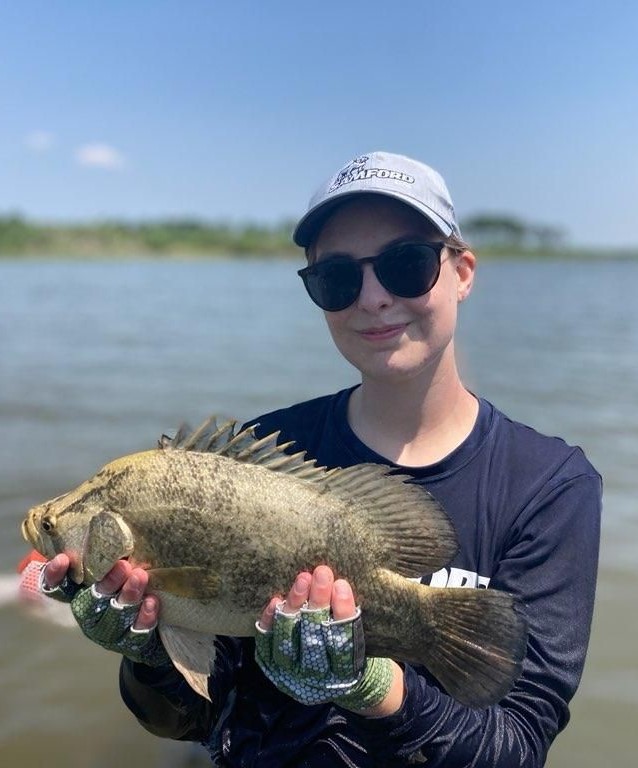Current Graduate Students
Ph.D. Students
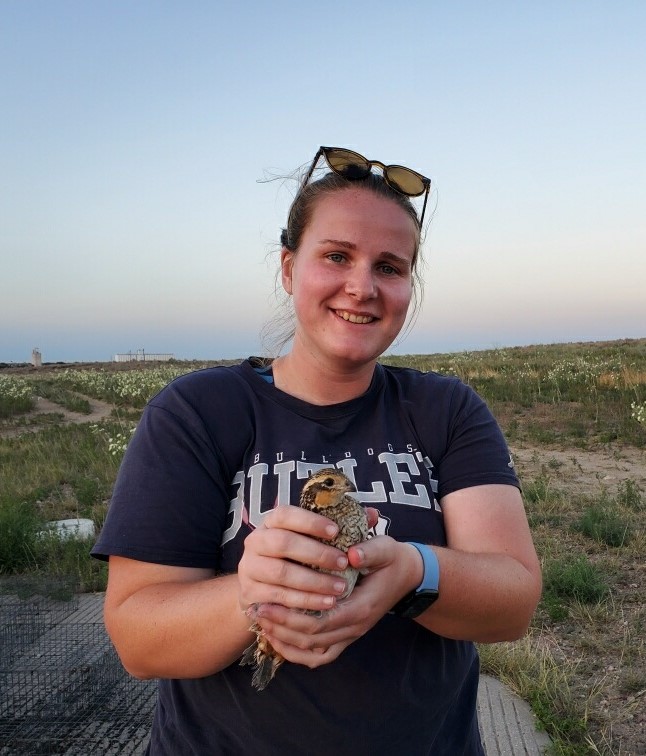
Natalie Pegg
npegg@ksu.edu
Project: Movements, Space Use, and Vital Rates of Mourning Doves
Advisor: Dr. David Haukos
Expected Completion: 2026
Degree Seeking: Ph.D.
Education: B.S., Butler University; M.S., University of Florida
Research Interests: Population dynamics, wildlife management, species interactions, habitat selection, urban ecology
Natalie is currently working on a dissertation focused on the breeding ecology of mourning doves in Kansas. The goal of her project is to provide baseline data that can be used to examine local population trends. In addition to vital rates, she is interested in looking into the impacts of competition and disease on mourning doves across Kansas. Natalie is originally from St. Louis, Missouri, and she received a bachelor’s degree in biology and chemistry from Butler University. In 2022, she completed a master's degree in wildlife ecology and conservation at the University of Florida where she focused on the habitat selection of specialist birds in residential neighborhoods.
Elisabeth Teige
teigeelli@gmail.com
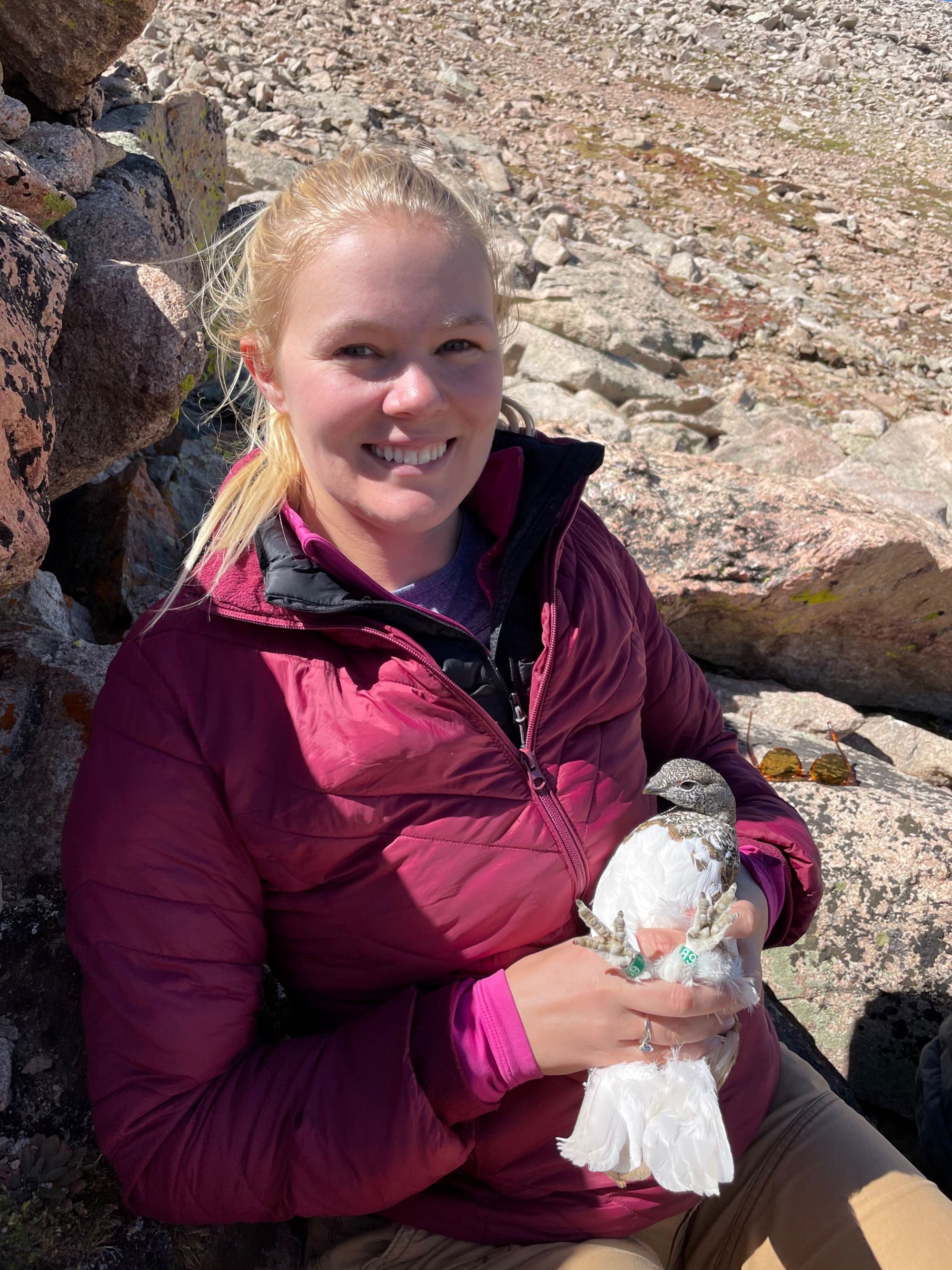
Project: Understanding lesser prairie chicken-use of the Conservation Reserve Program (CRP) by assessing vegetation characteristics and demographic outcomes of the habitat provided by CRP throughout the species’ range
Advisor: Dr. David Haukos
Expected Completion: 2026
Degree Seeking: Ph.D.
Education: B.A., Minnesota State University-Moorhead; M.S., Kansas State University
Research Interests: Population dynamics, wildlife management, habitat selection, wildlife conservation, species landscape interactions, community ecology
Elisabeth is currently working on a dissertation focused on the impacts of CRP on lesser prairie-chickens throughout Kansas. The goal of her project is to inform management strategies that can be used to support populations. She is interested in looking into the impacts of current CRP management practices on lesser prairie-chicken populations and how CRP supports species conservation. Elisabeth is originally from Poplar, WI and she received a bachelor’s degree in biology with an emphasis in ecology and evolutionary biology from Minnesota State University-Moorhead. In 2021, she completed a master's degree in biology at Kansas State University where she focused on the demographics, space use, and habitat selection of translocated lesser prairie-chickens.
Caroline Skidmore
carolineskidmore@ksu.edu
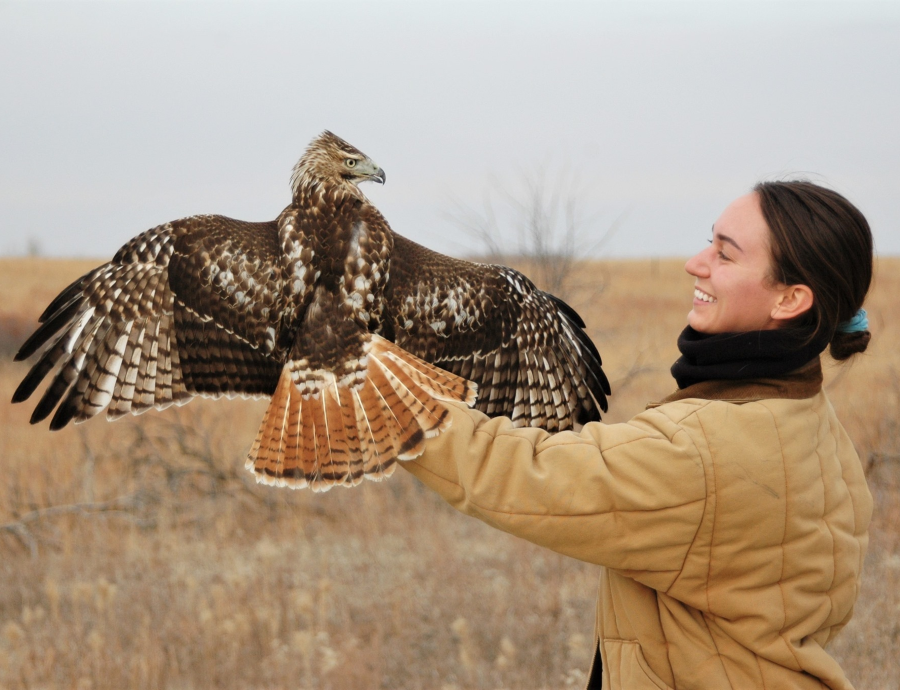
Project: Nest Site Selection and Survival of Wild Turkeys in Kansas
Advisor: Dr. David Haukos
Expected Completion: 2027
Degree Seeking: Ph.D.
Education: B.S., Kansas State University; M.S., Texas Tech University
Research Interests: Population dynamics, community ecology, avian ecology, pollinators
Caroline is pursuing a PhD in wildlife conservation, with her dissertation focusing on wild turkey nest success, productivity, and site selection in addition to hen survival. This project is funded by the Kansas Department of Wildlife and Parks and will aid in identifying management actions that may help reverse the current decline of wild turkeys in Kansas. Her previous experience includes working as a wildlife biologist for Fort Riley Military Reservation from 2020-2023, a M.S. thesis at Texas Tech University studying comparative nesting habitat of riparian raptors in the Chihuahuan Desert from 2018-2020, and a Bachelor of Biology from Kansas State University in 2017.
Sara Hansen
sjhansen@ksu.edu
Project: Landscape ecology of wild turkeys in Kansas
Advisor: Dr. David Haukos
Expected Completion:
Degree Seeking: Ph.D.
Education: B.S., California State University - San Bernardino; M.S., State University of New York, Syracuse
Research Interests:
M.S. Students
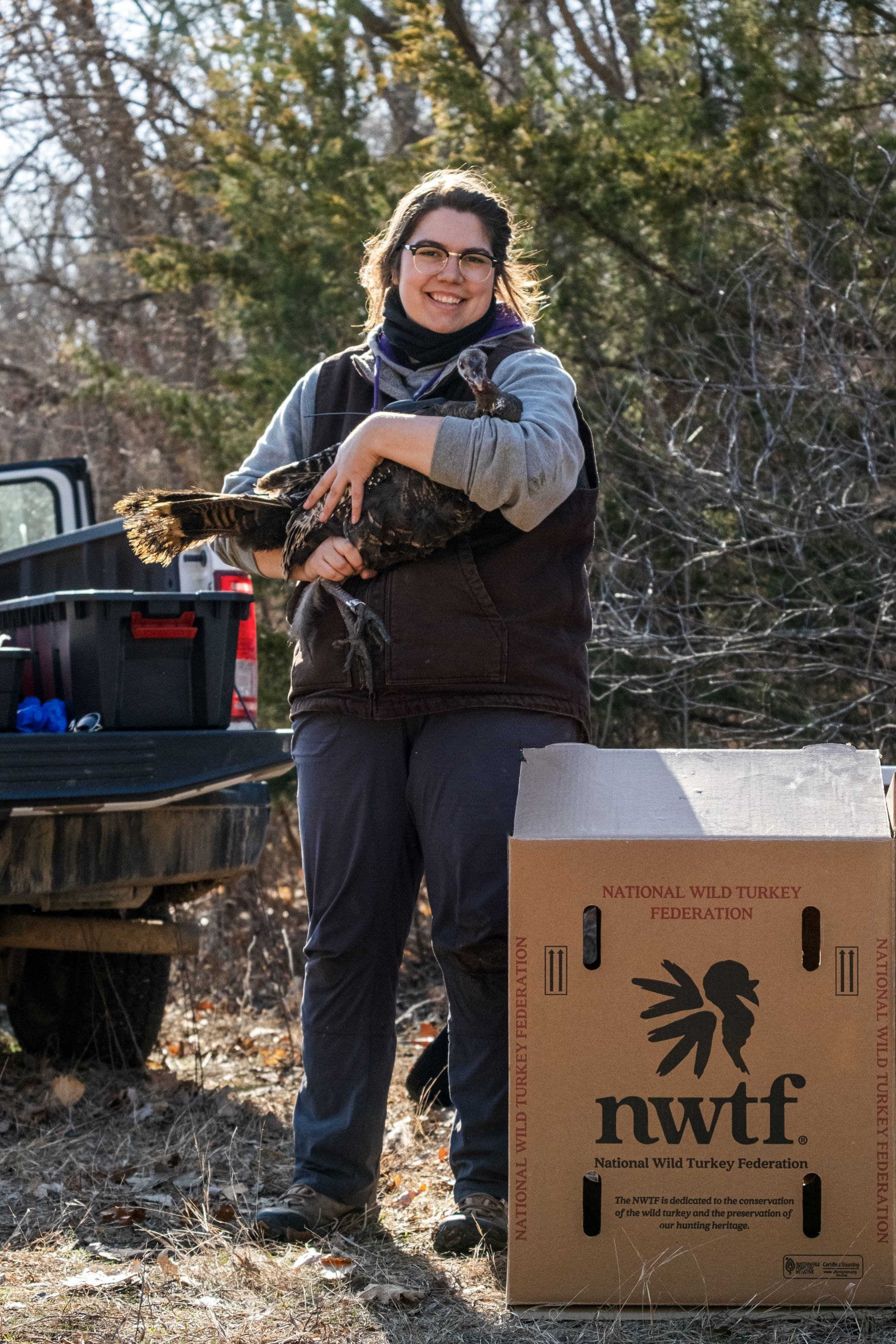
Mary Ware
mfware@ksu.edu
Project: Assessing roost site selection and impacts of land management on wild turkeys
Advisors: Dr. Dan Sullins and Dr. David Haukos
Expected Completion: 2026
Degree Seeking: M.S.
Education: B.A., Hastings College
Research Interests: Everything
Photo credit: Dr. Nellie Hill-Sullins
Mary is originally from Michigan, but received her undergraduate degree in Wildlife Biology from Hastings College in Nebraska. She is currently working on a cooperative project on Wild Turkeys across Kansas. The focus of her research is on wild turkey response to habitat management, use and availability of roost trees, and female response to hunting pressure.
Cassidy Lathrom
lathrcas000@ksu.edu
Project: Density, diversity, and relative abundance of bees on Fort Riley Military Installation
Advisor: Dr. David Haukos
Expected Completion: 2025
Degree Seeking: M.S.
Education: B.S., Kansas State University
Research Interests:
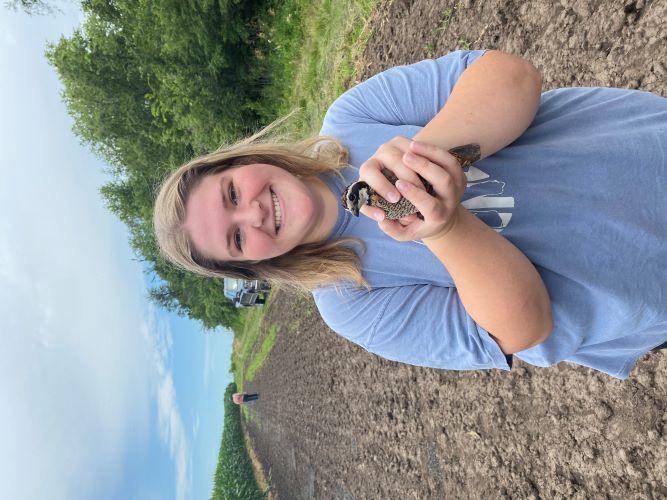
Katryn Stafford
kstafford2@ksu.edu
Project: Viability of Lesser prairie-chickens in Kansas
Advisor: Dr. David Haukos
Degree Seeking: M.S.
Education: B.S., Missouri Western State University
Research Interests: Wildlife conservation/ management, ornithology, avian ecology, GIS
Katryn is currently working towards a master's degree, with her research focusing on the landscape characteristics around lesser prairie-chicken leks in Kansas. This research is part of a larger project to conserve lesser prairie-chickens. Katryn is from Falcon, Missouri and received her bachelor's degree in Wildlife Conservation and Management from Missouri Western State University in the spring of 2023. She enjoys all things birds, reading, being outdoors, and spending time with friends and her two cats.
Shelby Kuck
skuck@ksu.edu
Project: Extracting management and conservation insights from biodiversity monitoring data for uncommon fish in Kansas
Advisor: Dr. Martha Mather
Degree Seeking: M.S.
Education: B.S., Samford University
Research Interests: Fish ecology, GIS, aquatic conservation and management
Shelby is originally from Nashville, Tennessee, and she received a bachelor’s degree in marine science from Samford University in Birmingham, Alabama. Shelby is currently working on her thesis focused on nongame fish populations that are native to Kansas and in need of restoration. The goal of her project is to utilize existing data of species occurrence and available GIS habitat data for guiding future sampling, research questions, and conservation/management actions. She hopes, in addition to learning more about habitat needs and associations of species in need of conservation, that her interdisciplinary team will be able to expand upon a framework for researchers and managers to collaborate in ongoing studies.
Cy Marchese
cmarchese@ksu.edu
Project: Nutrient dynamics of foods used by wild turkeys in Kansas
Advisor: Dr. Dan Sullins
Expected Completion: 2026
Degree Seeking: M.S.
Education: B.S., Ohio State University
Research Interests:
Randall Wilson
rhwilson@ksu.edu
Project: Quantifying Avian Predation Rate of the Colorado Pikeminnow
Advisor: Dr. Dan Sullins
Expected Completion: 2026
Degree Seeking: M.S.
Education: B.S, The University of Montana
Research Interests: Large scale wildlife conservation, wildlife management, urban ecology, environmental restoration, environmental law and policy
Randy is conducting a thesis study on avian predation of the federally endangered Colorado Pikeminnow. His research aims to estimate the potential predation risk posed by avian piscivores, such as great blue herons and common mergansers, on restocked Colorado Pikeminnow in the San Juan River, New Mexico. The findings will inform the Bureau of Reclamation and the Navajo Nation about the impacts of these bird species on Pikeminnow populations. Additionally, this research will help fish hatchery managers understand the effects of avian predation on hatchery-raised fish and may guide decisions on optimal release times and strategies. Originally from Acton, Massachusetts, Randy earned a bachelor's degree in wildlife biology from The University of Montana in 2018.
Kathryn Travis
katravis@ksu.edu
Project:
Advisor: Dr. Dan Sullins
Expected Completion:
Degree Seeking: M.S.
Education:
Research Interests:
